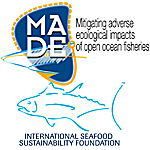The indiscriminate capture of non-target organisms (bycatch) in commercial fisheries undermines the sustainable development of marine resources. In the Northwest Atlantic, blue sharks (Prionace glauca) account for most of the bycatch in the Canadian pelagic longline swordfish fishery. Minimizing the capture of this species is of interest to conservationists as well as the fishing industry because the high incidence of shark bycatch negatively affects fishing operations through bait loss and increased handling time. Electropositive metals (e.g., lanthanide) oxidize in seawater and create electric fields, which can alter the swimming and feeding behaviors of several species of sharks. Although electropositive metals appear to have the potential to reduce shark bycatch in pelagic longline fisheries, there have not been any controlled trials reported from a commercial fishery. A total of 7 sets (6300 hooks) with 3 hook treatments (standard hooks, hooks with electropositive metals (neodymium/praseodymium), and hooks with lead weights) were deployed in 2011 on the Scotian Shelf in the Northwest Atlantic. The results of this study show that electropositive metals did not reduce the catch of blue sharks and do not appear to be a practical bycatch mitigation measure in the Canadian fishery.
- Presentation

 PDF version
PDF version
